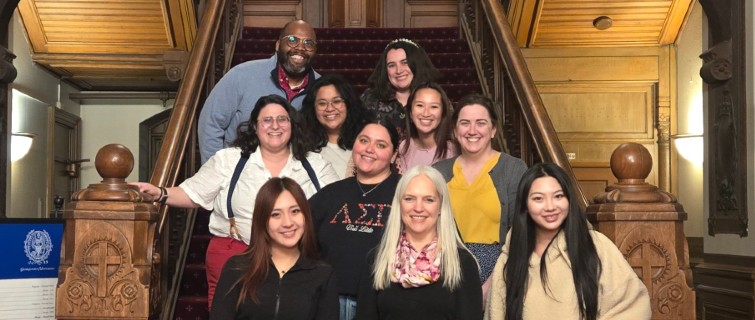
Even as a child, Amanda Reich knew she wanted to work in higher education. Growing up in Pittsburgh, where her father was a college professor and her mother worked at Hillel Jewish University Center, “college students were my babysitters, tutors, music teachers, and, more often than not, dinner guests,” she wrote in her application to the Master’s in Higher Education Administration program at Georgetown University in 2022. “[And I] always dreamed of a future for myself as a staff member on a college campus.”
A few months before starting the higher education program, Reich, then an admissions officer at Georgetown Law Center, had been encouraged to apply for the program director position for the Master’s in Sports Industry Management program. For Reich, the move to a more hands-on, “student-facing” role felt just right; it fulfilled her desire not just to help students navigate the program, but to create a community where everyone felt they belonged.
In her interview with Andrew Hirsch, Assistant Dean, Business and Management Programs at Georgetown’s School of Continuing Studies, Reich mentioned just one concern: sports. “Because, to be perfectly candid,” she says, “I don’t have very much experience with sports.”
There are, of course, many experts in sports (and many others who claim to be). But Hirsch didn’t need another sports expert for the program; he has a lot of those, from all segments of this exciting, multifaceted business. He wanted someone whose primary concern was students: how well they were navigating the program; how well it was meeting their individual needs and preparing them for their future careers.
“We hired you because you wanted to do higher education,” Hirsch told her. “Not because you wanted to do sports.”
An Affinity for the Forgotten and Marginalized
At the School of Continuing Studies (SCS), the faculty directors are the industry experts for Georgetown’s 15 Master of Professional Studies programs. The program directors make them all run smoothly. That means Reich is in charge of the day-to-day activities of the sports management program and of providing administrative support for current and graduating students. Among her many roles, she is the advisor to the Sports Industry Management Student Association and promotes the student-alumni network. She also has been instrumental in strengthening the partnership between the program and the Washington Nationals.

Reich attended Muhlenberg College in Allentown, Pa., as an undergraduate, majoring in History and Art History. She has always had an affinity for those who feel left out and marginalized. While working as a student at Muhlenberg’s Martin Art Gallery, she came across a long-lost file of illustrations by women artists from the Philadelphia area who were contemporaries of the American Impressionist Mary Cassatt (1844–1926).
“It was names you’ve never heard of, like Blanche Dillaye and Wuanita Smith,” Reich says. “A lot of them were illustrators—printmakers in illustration style. And the way I thought of it was: These women were meant to only create a certain type of art that was not seen as fine art.”
As part of her senior thesis, Reich curated a show of these forgotten works called: “A Place to Tell Her Story: Women Artists, Art Clubs, and Allies in Philadelphia.” The show recreated these artists’ world, with all its challenges and possibilities, at the turn of the 20th century.
A Pivotal Experience in Spain
Before joining Georgetown Law Center in 2019, Reich held several art- and education-related jobs, including nearly two years teaching English at an elementary school in Spain. That experience convinced her that she was on the right course.
“While I was abroad, I found that I was passionate about equitable educational opportunities by observing the public school system in Madrid, where students were provided with a bilingual education no matter their socioeconomic background,” she wrote in her Georgetown application. “I returned to the United States with a drive to better the education system, especially through higher education.”
Coming to Georgetown offered her another opportunity to express her love of learning, her belief in the salutary mission of universities, and her desire to create an inclusive environment for students that could serve as a model for society at large. Since 2023, she has been an officer in DEBIC (the Diversity, Equity, Belonging, and Inclusion Council) at SCS, and, in Spring 2024, she invited three authorities on DEI (Diversity, Equity, and Inclusion) to an SCS forum on how universities could promote these goals in the face of powerful pushback from opponents, including several state legislatures.
“There are a lot of attacks on DEI across the country that we don’t really have answers to,” Reich says. “I would love to hear from these people who have such incredible backgrounds in DEI” about how to respond to the backlash.
In 2023, for example, Texas passed a law prohibiting DEI programs at state colleges and universities. The law has led to job losses and transfers at universities throughout the state. In one case, the University of Texas, Austin, laid off about 60 people working in DEI in April 2024, a move that disproportionately affected women and Black employees.
The panelists for the forum included Judith Pérez-Caro, Ph.D., Interim Faculty Director and instructor for the Master’s in Higher Education Management program at Georgetown SCS; Rosemary Kilkenny, Georgetown’s Vice President for Institutional Diversity & Equity; and Kimberly Underwood, Ph.D., Research Chair for the University of the Phoenix Center for Workplace Diversity and Inclusion Research and an instructor in Georgetown’s Higher Education Administration program. They talked about concrete ways that colleges can support a diverse student body, even in places where DEI programs have been prohibited.
The overriding goal, as it has always been, is “full participation,” Reich says: ensuring that all students—irrespective of their race, ethnicity, religious views, sexual identification and orientation, disability, wealth, or lack thereof—can engage fully in all aspects of college life. And that means that every university employee, whether they work in DEI or not, needs to be proficient in the skills necessary for diversity, equity, and inclusion.
It’s a commitment that Reich and others doing this work at Georgetown see as essential to their jobs.
“We want the next generation of higher education administration professionals to take very much to heart that they are caring for other people across differences,” Pérez-Caro says. “Because the reality is, you are not going to encounter a student who’s like you—exactly like you, looks like you, acts like you, talks like you, is from where you are from, etc. And Amanda takes this very seriously.”
